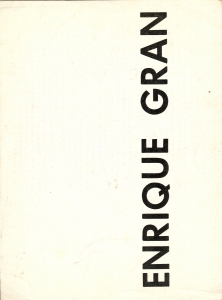ENRIQUE GRAN-JOSÉ DE CASTRO ARINES (1967)
Exhibition held at the Juana Mordó Gallery in Madrid.
A hurried, agitated, complicated and deep work of Gran, immersed in life, and thus bathed in a different river each time, always serious and human.
A painting faithful to a whole character. For this reason, because of this condition, it is intimately alive. It is one of the serious tasks of Gran this to live humanly, the feet on the ground; the thought, all action. That agitated composure of Gran’s work, that inquiring into the being of things, of the skin and air in which they breathe their intimacy; that perplexity with which my friend Enrique Gran discovers what it is to touch and what it is to dream of things… His feet on the ground, on rock.
From there, before his open eyes, the complicated world; the thought piercing the air, delving into the bag of his infinite promises, there where poetic things printed on universal things crouch, architectures, with the most diverse material, some measurable and others like smoke, among which are those things that for Keplero were already understood as mystical and that were no more and no less than the celestial orbits.
How wonderful! From which it follows that there is no distance between what is real and what is fantastic; between what is locked up in my hand and the ghost that is activated in such confinement. And so Gran describes through his painting that reality – the one in my hand
doubly hidden – it shows itself under and over his flesh, caressing his skin, dancing around him, or burying the scalpel in his entrails.
Everything has this real polarity of being and not being of the big and small things. And since Gran knows this and applies this knowledge to his inventiveness, I would call Enrique Gran a surrealist, if surrealism were considered in the way it certainly is and was
The time that pairs Breton and Einstein, and you do not stop counting.
The Theresian God who walks among the pots, is the God who, applying his will to art, makes the Samothrace victory and the express pot equally emblematic. That is why, for such a condition, what is important is to know that not even the edge of a knife can open a distance between what is real in its visibility and what is real in its magicism, as Gran describes it and I see in its inventiveness.
José de Castro Arines
